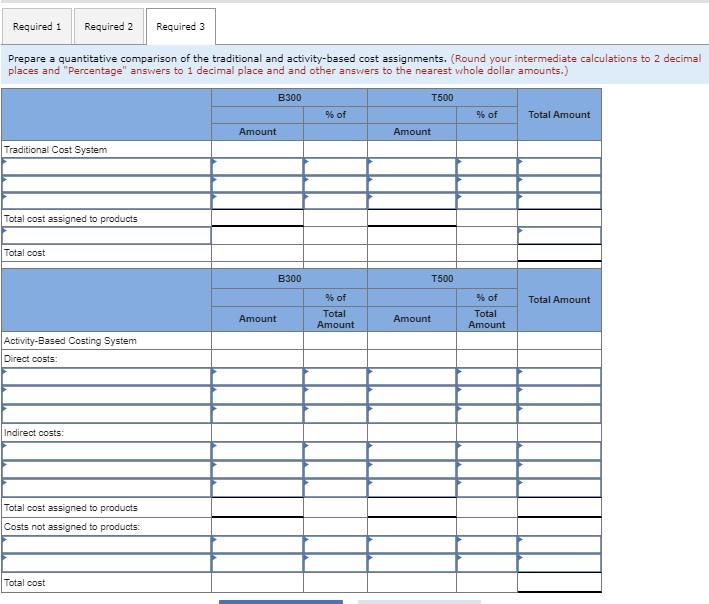Question
Hi-Tek Manufacturing, Incorporated, makes two types of industrial component partsthe B300 and the T500. An absorption costing income statement for the most recent period is
Hi-Tek Manufacturing, Incorporated, makes two types of industrial component partsthe B300 and the T500. An absorption costing income statement for the most recent period is shown:
| Hi-Tek Manufacturing Incorporated Income Statement | |
| Sales | $ 1,708,000 |
|---|---|
| Cost of goods sold | 1,259,332 |
| Gross margin | 448,668 |
| Selling and administrative expenses | 580,000 |
| Net operating loss | $ (131,332) |
Hi-Tek produced and sold 60,200 units of B300 at a price of $20 per unit and 12,600 units of T500 at a price of $40 per unit. The companys traditional cost system allocates manufacturing overhead to products using a plantwide overhead rate and direct labor dollars as the allocation base. Additional information relating to the companys two product lines is shown below:
| B300 | T500 | Total | |
|---|---|---|---|
| Direct materials | $ 400,400 | $ 162,600 | $ 563,000 |
| Direct labor | $ 120,300 | $ 42,900 | 163,200 |
| Manufacturing overhead | 533,132 | ||
| Cost of goods sold | $ 1,259,332 |
The company has created an activity-based costing system to evaluate the profitability of its products. Hi-Teks ABC implementation team concluded that $55,000 and $102,000 of the companys advertising expenses could be directly traced to B300 and T500, respectively. The remainder of the selling and administrative expenses was organization-sustaining in nature. The ABC team also distributed the companys manufacturing overhead to four activities as shown below:
| Activity Cost Pool (and Activity Measure) | Manufacturing Overhead | Activity | ||
|---|---|---|---|---|
| B300 | T500 | Total | ||
| Machining (machine-hours) | $ 213,782 | 90,800 | 63,000 | 153,800 |
| Setups (setup hours) | 158,850 | 73 | 280 | 353 |
| Product-sustaining (number of products) | 100,400 | 1 | 1 | 2 |
| Other (organization-sustaining costs) | 60,100 | NA | NA | NA |
| Total manufacturing overhead cost | $ 533,132 | |||
Required:
1. Compute the product margins for the B300 and T500 under the companys traditional costing system.
2. Compute the product margins for B300 and T500 under the activity-based costing system.
3. Prepare a quantitative comparison of the traditional and activity-based cost assignments.



Step by Step Solution
There are 3 Steps involved in it
Step: 1

Get Instant Access to Expert-Tailored Solutions
See step-by-step solutions with expert insights and AI powered tools for academic success
Step: 2

Step: 3

Ace Your Homework with AI
Get the answers you need in no time with our AI-driven, step-by-step assistance
Get Started


